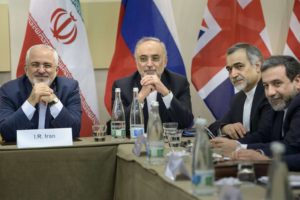by WorldTribune Staff, September 6, 2016
The Obama administration is not only letting Iran “push the envelope” but appears to be acting as the Islamic Republic’s “lawyers” when it comes to enforcement of last summer’s nuclear deal, an Israeli analyst said.
“Iran is continuing to push the envelope, trying to get as much as it can, even within the confines of this deal,” Dr. Emily Landau, head of the Arms Control Program at the Tel Aviv-based Institute for National Security Studies, told The Jerusalem Post on Sept. 5.

While the U.S. continues to insist that Iran is in compliance of its side of the deal, “Israel can’t be satisfied with that,” Landau said, due to a host of “worrying dynamics and other issues” that Washington is ignoring, as well as the fact that “the JCPOA is tremendously flawed.”
Landau cited a report published last week by the Institute for Science and International Security that revealed Iran received a number of exemptions from the Obama administration ahead of implementation of the nuclear agreement in January 2016.
Those exemptions included not counting enriched uranium that had been converted into other chemical forms, which may have allowed Iran to surpass its 300 kilogram cap of low enriched uranium, Landau said.
State Department spokesman John Kirby recently introduced the term “usable” uranium as a means of justifying this, Landau said. Kirby also referenced a secret joint commission with Iran, which he used as a “shield of confidentiality to ward off questions.”
Landau also pointed to revelations that inspections of the Parchin nuclear site were concluded as part of a side deal between Iran and the International Atomic Energy Agency (IAEA) with no American involvement.
“It was not even clear if Congress knew those details,” Landau said.
Landau also cited a July Associated Press report, which was reportedly based on a secret document showing that in 11 years, restrictions on Iranian uranium enrichment would begin to be lifted, rather than the previously believed 15 years.
“All these cases are creating a growing lack of confidence in the [Obama] administration regarding the things it is saying on the Iran deal,” Landau said.
Landau also pointed out that even after supreme leader Ayatollah Ali Khamenei leaves power, hardline ayatollahs will remains in power in Iran due to the new makeup of Iran’s Assembly of Experts, which picks supreme leaders.
“They, together with the Revolutionary Guards, have the real hold on power,” Landau said. “There is no basis, right now, for dreams of moderation. Yet the U.S. is acting as if we are on the road to a changed Iran.”
A new opportunity for Israel is on the horizon, though, as President Barack Obama’s term ends in January, giving Israel a chance to establish a new dialogue with the next administration to formulate a response to Iran, Landau said.
